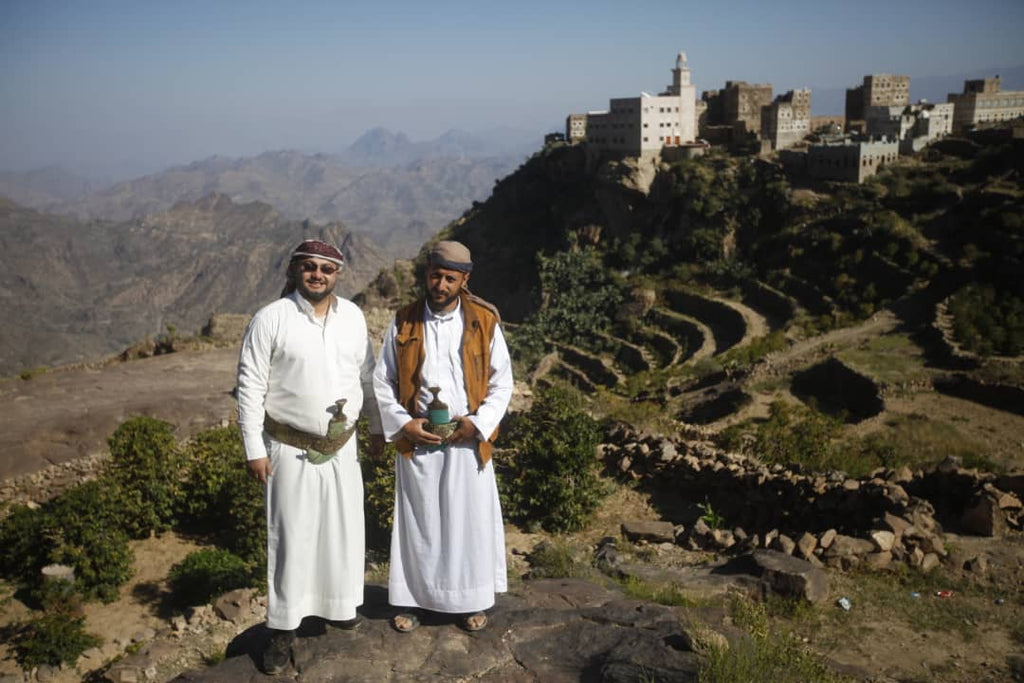Geographically, Yemen is located in the southern Arabian peninsula, in Western Asia. It borders the Arabian Sea, the Gulf of Aden, and the Red Sea. A number of the Red Sea islands belong to Yemen and many of them are volcanic, with the most recent eruption on the island of Jabal-al-Tair in 2007.
YEMENI COFFEE – THE HISTORY
‘After Ethiopia came Yemen’
Yemen has always been known as being part of the ‘origin of coffee’ story and is considered by many the birthplace of coffee drinking. It also holds the ‘title’ of where the coffee blend originates – you must have heard of the famous Mocha Java coffee (and no, I definitely don’t mean a coffee with added chocolate!). I will explain…
There are a couple of myths, stories surrounding the discovery of the coffee bean in Yemen. In fact, from trying to find out more about it all, I came to the conclusion that out of the two stories I came across the most, the one I would consider a myth and the other closer to the truth. I will however, let you make up your own mind!
The Myth
A Sheikh from Mocha was sent to exile and after days of starvation and of nothing to do, he noticed some birds flying with quite an unusual energy and feeding off the bright red coloured berries of a nearby plant. The Sheikh tried eating the berries himself but they tasted bitter so he decided to put the berries onto the fire and ‘cook’ them so to speak in the hope they would taste better. They did end up being roasted but incredibly hard to bite into. He then thought of adding them to a pot of boiling water in the hope of them softening up.Whilst the berries were on the boil, he ended up drinking the concoction instead because it smelt so good (well we know that to be true!) in addition giving him a boost of energy!
Not sure if you can survive on coffee alone, but he survived his exile and when the exile was lifted and he returned to Mocha, he brought with him these magical berries and the rest is history as they say!
The Truth(?)
It is widely believed that the cultivation of coffee in Yemen, was first introduced by Sufi Monks who made the stunning discovery that the seed on the coffee cherries could be roasted, ground and made into a drink which gave you energy. They say this happened back in the 1400s!!! And later on, the port of Mocha would become the world’s main marketplace for coffee for nearly three centuries (that’s another story for another time!)
And this is reason why Yemen is considered to be the birthplace of coffee, alongside Ethiopia, but for the brewing and the drinking! 😊 (no complaints there!)
YEMEN – THE COFFEE
Geography
It is normally fairly easy to describe the growing regions of an origin, however, when it comes to Yemen, names of places are kind of lost in translation i.e. westernised spellings of names of places vary considerably. It doesn’t help that the country’s regions are not given names because of their geographical location, but they are given names as governorates.
In terms of the coffee growing regions, there are a couple that you may recognise, such as Haraz (Haraaz or Harazi), Sana’a (San’ani), Bani Mattar (Matari), Bani Ismail (Ismaili) – you can see what I mean about the naming? The coffees from these regions have become a bit more celebrated, more ‘known’. I deliberately didn’t use the word ‘popular’ because these coffees are still so rare and hard to come by, both as a roaster and a consumer.

Cultivation
I am going to concentrate in the two areas where our coffees come from, one being from the Bani Mattar region and the other from the Haraz region.
The Bani Mattar region is located west of the capital city of Sana’a. The region is exceedingly high in altitude and of course this is what gives Mattari coffees their intensity. To be specific, the altitude here where the coffee is grown ranges between 1981 m to 2200 m above sea level.
Haraz is a broader area which includes the Haraaz mountain and to its north, is another coffee growing region, the Bani Ismail region. Haraz coffee is also grown in the mountains at high altitudes.
The climate in the terraced mountainsides of both regions is not always great for the cultivation of coffee and particularly here, the dry hot climate is not easy. However, the combination of high altitude, dry climate and rich soil is what makes Yemeni coffees the exquisite coffees they are.
Coffee is still cultivated in the age-old traditional methods. The farmers carry out the entire process of sowing the seeds, picking the berries, sorting them, hulling, and transporting them to the docks manually.
WHY IS YEMEN COFFEE SO EXPENSIVE?
There are many factors why some coffees are more expensive – as you may have learned from a couple of my previous blogs – but there is one key component that is the one constant in all expensive coffees and that is rarity!
Farming Challenges
To me, it totally makes sense, and it rings true with most things, the rarer something is, the harder it is to get hold of and the more you pay to get it. That is not to say that quality suffers due to the scarcity of something. Actually, most times quality and rarity go together. In this case, it does.
Farms in Yemen are extremely small compared to other producing countries and producers will harvest as little as five or even 1 kilogram of coffee throughout the season (most green coffee bags from Yemen arrive in 25kg bags, not the usual 60 kg-70 kg bags we get from other origins). Quality checks following harvest, ahead of export, means that the initial harvest is reduced yet again. As mentioned above, the extreme dry conditions also make the growing of coffee here extremely difficult.
War
Yemen is crippled amidst war. Yemen is in geopolitical conflict and among other things, exporting of coffee from Yemen is a logistical nightmare and extremely challenging for exporters and certificates are needed from government bodies for the containers.
The civil war means the main challenge in transporting the coffee from the regional warehouse to the port includes a large number of checkpoints. These are mostly official, but unfortunately there are checkpoints which are not. The checkpoints manned by non-government officials, means these ‘rebels can make the transportation even harder. Any checkpoint, and the amount of these, means a huge amount of time is spent explaining who, what and where before passage is allowed. Some of these also require some sort of payment in order to be allowed through.
When the coffee finally arrives to port, the port of Aden, containers need to be found and costs go up once again. The shipping infrastructure has also come to a halt due to the war and this means more time spent to find suitable containers.

OUR COFFEE
YEMEN MOCCA MATARI
Our first coffee is a Mocca Matari, from the Bani Matar district. It is grown by small holder farmers and due to Yemen being in the middle of a war, this coffee too, has had quite an adventure in getting to us. The mill team has told us stories that the mill itself shakes from bomb blasts on a regular basis and that prior to export these bags are sometimes moved to different locations depending on what area of the town the air strikes were focused on.
This coffee has notes of grape, tropical fruit; it’s clean and earthy with a creamy body and juicy citrus acidity.

As you can see a hell of a lot goes into a Yemeni cup of coffee from money, to effort, to resources, making it one of the most expensive and sought-after coffees in the world. This hard to access coffee however comes from one of the oldest sources of the bean in the world.
Yemen coffees are distinct and highly praised, renowned for its richness and smoothness. The extremely dry conditions and the high elevations gives the beans a richer more concentrated flavour. The combination of low supply and high demand for the reasons mentioned, make it a rare and expensive commodity.
When you sit and relax with a cup of Yemen coffee, you can now appreciate the rare and special experience!
Sip it slow and enjoy!


